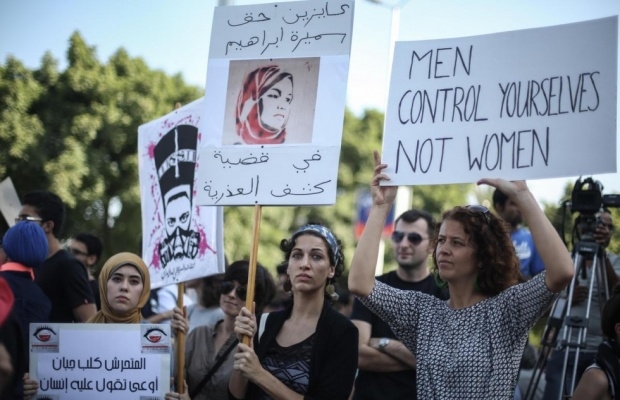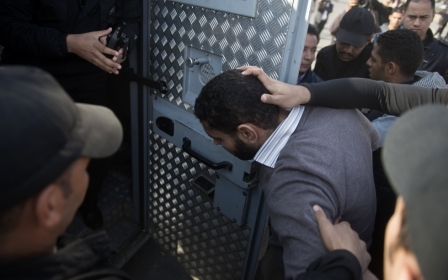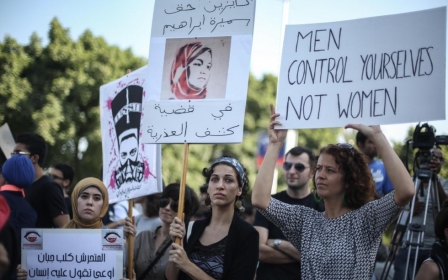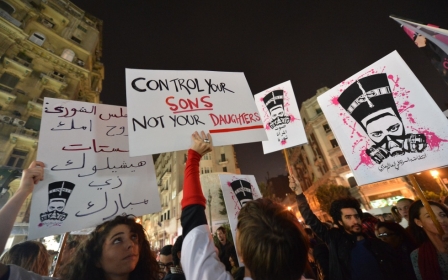Egypt: wake up to the serious crime of sexual violence

Two weeks ago, Egypt found itself with a new president - Abdel Fattah al-Sisi. Supporters gathered in Tahrir Square to celebrate Sisi’s rise to power, but the mood in one part of the square quickly turned very dark. The jubilation that day was tainted by heinous crimes, that brought to light cultural realities endemic within Egyptian society.
A wild mob of men brutally gang raped a woman, whose clothes were torn from her bloodied body as she was dragged across the square. The attack was filmed and trended globally, as the world stood still, in shock at what had taken place. The tragic scene was made all the more distressing by the helpless sight of a single police officer waving his pistol in the air as he tried to help the woman. She was one of nine women reported as being sexually assaulted that night.
In a positive and unprecedented move, President Sisi visited the woman in hospital,where he told her: ''I have come to tell you and every Egyptian woman that I am sorry. I am apologising to every Egyptian woman.'' He promised a decisive response.
However, for many, the video and its disturbing undertones came as no surprise. And while welcomed, the words of Egypt’s new President will be treated with great distrust by human rights campaigners.
The Egyptian revolution is surely the most reported, documented and captured revolution in the history of humankind. Those in the the thirty something generation– will one day describe to their grandchildren images of a filled laser-lit Tahrir Square, or the sight of an Egyptian Army officer praying with the revolutionaries, as President Mubarak's henchmen sprayed the worshippers with water cannons.
For many, however, the most piercing and harrowing image of the revolution came during December 2011, when an Egyptian woman, clad in traditional Islamic garb, was dragged down a street by soldiers, who then mercilessly beat her with batons and stripped her down to her blue underwear. The colour blue took on greater significance, as it later came to symbolise the struggle of Egyptian women in graffiti and artwork sprawled across Cairo.
The soldiers involved were, for sure, an ugly example of humanity. But it was something else that caught the attention of many that day; the sight of men hurriedly walking by, or looking on from a distance, as this helpless woman was dragged, beaten and stripped. And while the young woman targeted was certainly the victim of a humiliating violation of her person, it was undeniably the soldiers and passive onlookers who were criminal and without dignity.
Sadly, this was far from an isolated incident, but rather a symbolic representation of a much wider problem that continues to plague the country today; that is, the oppression and marginalisation of women across Egypt and, indeed, much of the Muslim world. This fact was made manifestly clear in a United Nations report which found that over 99% of Egyptian women had experienced sexual harassment and that more than 90% suffered unwelcome physical contact.
During protests in March 2011, male soldiers infamously detained a number of women who they subsequently tortured, humiliated through degrading strip searches and coerced into having highly invasive virginity tests when threatened with the prospect of prostitution charges. In some cases women were even filmed.
One famous example is found in the case of Samira Ibrahim. After she was beaten, electrocuted and stripped, soldiers forced her to undergo one of these procedures. Following her release, she battled through a case against an Army doctor accused of having carried out forced virginity tests on women who had been protesting in Tahrir Square in 2011. Here Egypt stood, poised, with an opportunity to put behind it the misogyny of the Mubarak era and set a precedent of equality and dignity. Quite predictably, however, justice was not served and the case against the doctor was acquitted. The tears of Samira Ibrahim outside the court on that day were indeed the tears of a nation let down.
Despite the travesty of the court’s decision, those campaigning for justice persevered and some months later overcame (the Supreme Council of the Armed Forces) SCAF when a civilian court ruled that such tests were henceforth illegal. Ms Ibrahim went on to declare, “I will not give up my rights as a woman or a human being.” Unfortunately, Ms Ibrahim’s courageous stance was later somewhat overshadowed by reprehensible anti-semetic remarks she made on twitter.
The then Major General Abdel Fattah al-Sisi, Egypt’s newly elected President and former Army chief, later confirmed to Amnesty International that the tests had been carried out on seventeen female detainees. Defending the Army’s position, he added in a very bizarre statement that the tests were in place to protect the Army against possible allegations of rape and were also carried out on women seeking to join the military ranks. One hopes that his latest stance indicates a change of view.
The forced virginity tests were, of course, just one of many tools used by various groups in their attempts to silence the voices of women through humiliation and intimidation. Since the beginning of the Arab Spring, a large number of women protesters have been sexually assaulted or raped in and around Tahrir Square ('Tahrir' ironically means 'Independence'). Such heinous tactics are by no means new to Egypt, finding their roots in the Mubarak era. In May 2013, for example, a group of activists took to the streets to mark eight years since the infamous 2005 Black Wednesday, when a group of women were targeted and sexually assaulted by plain-clothes policemen for protesting. Nearly a decade on, and they are still awaiting an opportunity to seek recourse in the criminal courts.
Alongside civilians, a number of high profile journalists have been the target of such assaults. The rape of the respected CBS journalist Lara Logan is perhaps the most prominent example of this crime, which continued on throughout the rule of the Muslim Brotherhood. While SCAF seemed to ignore the issue completely, the Muslim Brotherhood acknowledged the problem, only to do nothing to combat it.
Last year's infamous 30 June opposition protests by no means marked an end to sexual assaults. On the contrary, Egypt saw a sudden spike in the number of attacks. Sources suggest that there were some ninety-one reported incidents of sexual assault and rape over the four days of the protests in Tahrir Square. Given the stigma attached to reporting sexual assaults, particularly within a society with a history of ignoring sexual crimes, the actual number of assaults is likely to be much higher. Human Rights Watch even published some chilling video accounts of women who survived sexual assaults in Tahrir Square.
Days before the recent Presidential elections, former president Adly Mansour, widened the definition of 'harassment' and increased the range of punishments open to offenders. His changes marked only a small step in the right direction. The recent sexual assaults spurred Sisi to establish a governmental body, inclusive of Egypt's religious leaders, to investigate the root causes of what some have termed Egypt's sexual 'rape culture'. They have placed 12 proposals to tackle the epedemic, mainly focusing on awareness and educational campaigns.
Some feel that for Egypt to protect the rights of women, awareness campaigns must be backed up by robust legislative reforms that reflect standards rooted in international law. For example, Human Rights Watch published a series of legal reforms suggested by Rothna Begum who wrote:
“The Egyptian authorities are required to act—both under the Convention on the Elimination of All Forms of Discrimination against Women, to which Egypt is a state party, and Egypt’s new constitution, to protect women against all forms of violence.”
President Sisi’s public statements since the inauguration day attacks are a positive first step. However, turning the tide on sexual violence requires the implementation of a comprehensive and coordinated approach that tackles all forms of violence against women.
The poet Rumi once wrote, “Where there is ruin, there is hope for a treasure.” And so, despite the utter failure of successive Egyptian governments and ruling elites to protect the rights of women, the spirit of Egyptian women affords their daughters great optimism of a future of female empowerment, where women are able to command dignity, respect and rights.
-Adam Walker has published works on various issues related to the history, law and social affairs of the MENA region. He is also co-editor of the first western encyclopaedia on the Prophet Muhammad.
The views expressed in this article belong to the author and do not necessarily reflect the editorial policy of Middle East Eye.
Photo credit: Women in Cairo demand greater protections from sexual harassment (AA)
Middle East Eye propose une couverture et une analyse indépendantes et incomparables du Moyen-Orient, de l’Afrique du Nord et d’autres régions du monde. Pour en savoir plus sur la reprise de ce contenu et les frais qui s’appliquent, veuillez remplir ce formulaire [en anglais]. Pour en savoir plus sur MEE, cliquez ici [en anglais].





